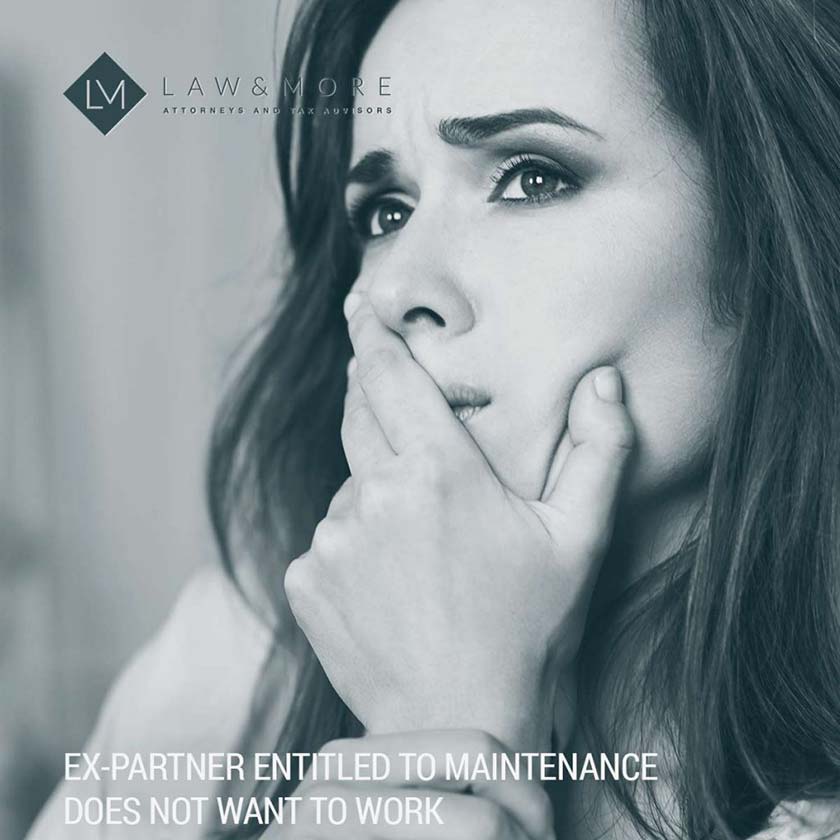Is Your Ex-Partner Eligible for Alimony?
In the Netherlands, maintenance is a financial contribution to the living expenses of the former partner and any children after a divorce. It is an amount that you receive or have to pay on a monthly basis. If you do not have enough income to support yourself, you are entitled to alimony. If you do have sufficient income to support yourself but your ex-partner does not, you may be required to pay alimony. The standard of living at the time of the marriage is taken into account.
The award of spousal support is based on the need of the entitled party and the financial capacity of the obligated party. In practice, this is often the subject of discussion between the parties. It could be that your ex-partner claims alimony while he or she could actually be working themselves. You may find this very unjust, but what can you do in such a case?
Spousal support
The person claiming spousal support must be able to prove that he or she has no or insufficient income to support him or herself and that he or she is also unable to generate that income. If you are entitled to spousal support, the starting point is that you must do everything in your power to provide for yourself. This duty stems from the law and is also called an obligation of effort. It means that the ex-partner entitled to alimony is expected to look for a job during the period he or she receives alimony.
The obligation to make an effort is the subject of much litigation in practice. The obligated party is often of the opinion that the entitled party can work and generate income that way. In doing so, the obligated party often takes the position that the recipient should be able to earn enough money to support himself. To support his or her point of view, the obligated party can submit evidence of, for example, the educational course(s) followed by the recipient and available jobs. In this way, the obligated party tries to make it clear that no maintenance will have to be paid, or at least as little as possible.
It follows from case law that the obligation of the maintenance creditor to make an effort to find a job should not be taken lightly. The maintenance creditor has to prove and substantiate that he or she has made sufficient efforts to generate (more) earning capacity. Thus, the maintenance creditor will have to prove that he or she is needy. What is meant by ‘demonstrating’ and ‘making sufficient’ efforts is assessed in practice per specific case.
In some cases, the maintenance creditor cannot be held to this obligation of effort. This can be agreed upon in the divorce covenant, for example. You can also think of the following situation that has arisen in practice: the parties are divorced and the husband has to pay partner and child support. After 7 years, he asks the court to reduce the alimony, because he thinks the woman should be able to support herself by now. At the hearing it appeared that the couple had agreed during the divorce that the woman would take care of the children on a daily basis.
Both children had complex problems and required intensive care. The woman worked approximately 13 hours per week as a temporary employee. As she had little work experience, partly because of the care for the children, it was not easy for her to find a permanent job. Her current income was therefore below the social assistance level. Under these circumstances, the woman could not be required to fully fulfil her obligation to make an effort and to expand her work so that she would no longer have to rely on spousal support.
The above example shows that it is important for the obligated party to keep an eye on whether the recipient is fulfilling his or her obligation to make an effort to generate income. Should evidence show the contrary or should there be any other suspicion that the obligation to generate income is not being met, it might be wise for the obligated party to start legal proceedings in order to have the maintenance obligation examined once more. Our experienced family law lawyers will be happy to inform you about your position and assist you in such proceedings.
Do you have questions about alimony or do you wish to apply for, change or terminate alimony? Then contact the family law lawyers at Law & More. Our lawyers are specialised in (re)calculating alimony. In addition, we can assist you in possible maintenance proceedings. The lawyers at Law & More are experts in the field of personal and family law and will gladly guide you through this process, possibly together with your partner.
